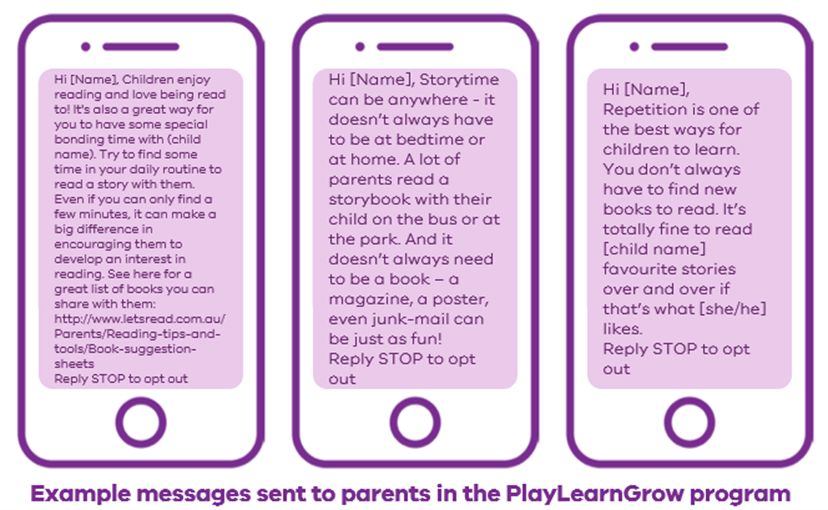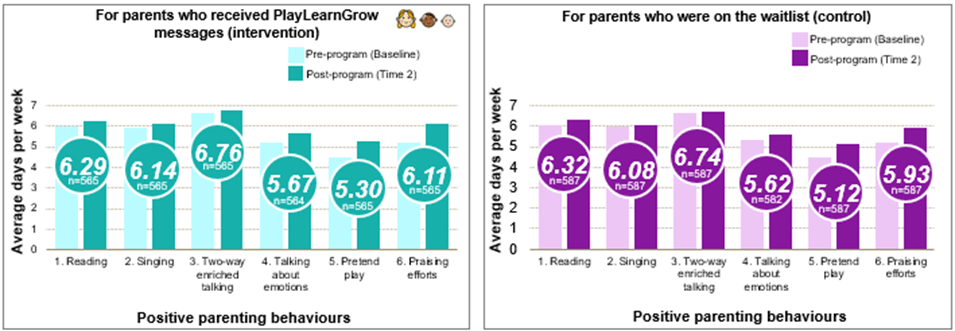Parent behaviours and the home learning environment have significant and lasting impacts on children’s learning and development outcomes.
At the Victorian Government, we're committed to improving early childhood development. One approach to doing this is to strengthen the home learning environment and support parents to deliver the optimal learning and development experience for their children.
The behavioural challenge
Knowing what to do as a parent can be difficult. For example, how much time you should spend with your child, the best way to support their growth, and what advice to follow as you watch them grow. Some parents may believe that they don’t have the time to adequately engage with their children, may not know how important it is, or may doubt the positive impact that they can have. Understandably, parents also only have so much time in their schedule and may not be able to engage with services designed to support them.
What we did
To address these barriers, we worked with the Department of Education and the Parenting Research Centre to design the PlayLearnGrow program which sent SMS messages to parents of two-year-olds three times a week for 24 weeks.
These messages included practical advice and activities to support their child’s learning, development, and wellbeing.
Parents received a 'Fact, Tip and Growth' message each week to reinforce positive parenting behaviours. The themes of the messages alternated between reading, talking, and playing.
We applied behavioural insights principles in the design of the sign-up process, evaluation, and the wording of the messages themselves to increase engagement and boost uptake of the program. This included:
- overcoming present-bias
- including clear calls to action
- keeping the messages short and simple
- providing norms that describe what others are doing.
Overcoming present-bias
Overcoming present-bias and procrastination (our tendency to focus on immediate costs and benefits over longer term ones) by highlighting the continuing benefits of the parenting behaviour.
Clear calls to action
Including clear calls to action so that parents knew exactly what it was recommended they do. E.g. “Try pretending to be dinosaurs on an adventure, or pretend that a cardboard box is a spaceship, a car, or a boat”.
Keeping it short and simple
Keeping the messages short and simple to prevent information overload for busy parents.
What other parents are doing
Providing norms that describe what other parents are doing to boost engagement. For example, "many parents find [action] helps reinforce the message to their child that what they have to say is important."

We evaluated the program in a pilot with 3,637 parents, using a survey to test whether the program increased the use of specific positive parenting behaviours, as well as whether it improved other behaviours and perceptions that might be related to positive child development.
What we found
- Engagement was high - 85% of participating parents read all messages and 42% tried a majority of the ideas provided.
- 83% of respondents rated the program as 8/10 or higher.
- Overall, parents found the program useful and engaging, with most saying they would recommend the program to other parents and only 115 people (8.5%) opting out of receiving the messages across the entire program.
- We found that the program led to a statistically significant increase in parents’:
- knowledge of positive parenting
- levels of confidence to engage in positive parenting behaviours
- perceived time available for engaging in behaviours
- perceived levels of support.
- These mechanisms are important for facilitating and driving positive behaviours, including parents’ reading, talking, and playing with their child.
- While we did not find an increase in specific self-reported positive parenting behaviours, this may have been because parents were already demonstrating high levels of these behaviours at the start of the trial.

I liked the range of information and how it easily explained the benefits and always gave an example. It made everything click together.
PlayLearnGrow gives parents the advice and resources they need to support their child’s learning, development and wellbeing. The trial has shown that a program like this can be useful for parents and that is why we are expanding it to enable more parents to see the benefits.
Thanks
We thank our partners at the Department of Education and Training and the Parenting Research Centre.
Updated